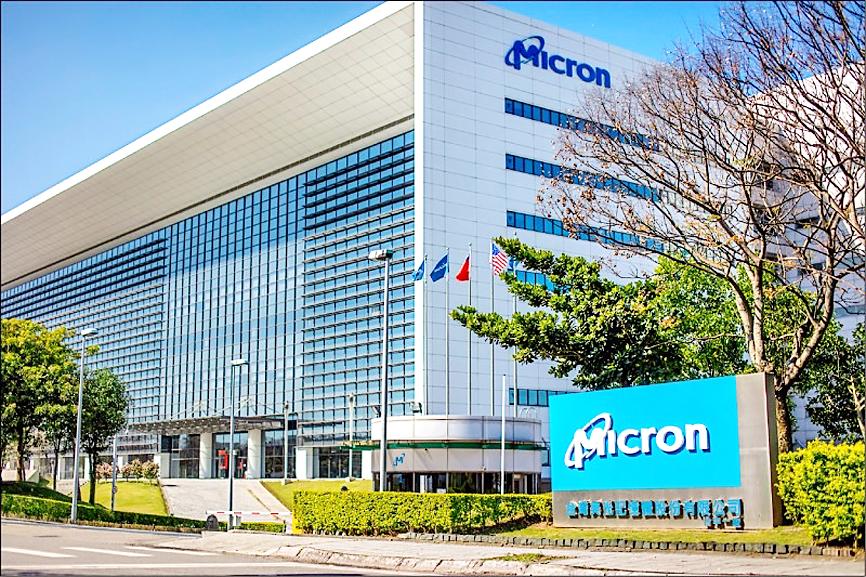Semiconductor stocks on Friday took a beating after a grim profit warning from Idaho-based Micron Technology Inc sparked fresh worries about the US’ earnings power as the country is potentially heading for a recession.
Despite a broader stock market rally, the Philadelphia Stock Exchange Semiconductor Index dropped 3.8 percent after Micron, the largest maker of memory semiconductors in the US, flagged that demand was cooling for chips used in computers and smartphones.
The index — which is home to US chip giants Advanced Micro Devices Inc and Nvidia Corp, as well as Micron — is down 38 percent this year.

Photo courtesy of Micron Technology Taiwan Inc
Historically, semiconductor stocks have been a key barometer for the broader stock market and economy. Chips are used in a broad range of industries that are important for growth: appliances, data centers, gaming and artificial intelligence.
If conditions are weak for chips, it raises questions about demand in other segments of the economy, which is a troubling harbinger for the stock market, said Matt Maley, a senior strategist at Miller Tabak + Co.
“We had nowhere near enough chips, and now the demand is falling,” Maley said. “What signal does it send? It highlights a growing concern that the slowdown we’re going through will turn into a recession.”
The semiconductor shortage, driven by factors on the demand and supply sides, has eased somewhat, but there is still limited production for certain chips used in vehicles and home appliances. Troubling reports from semiconductor companies ahead of their second-quarter earnings are spurring fears that demand would exceed supply for even longer.
“What this weakness indicates is that the economy is slowing, and there’s potential for a recession,” said Tim Ghriskey, a senior portfolio strategist at Ingalls & Snyder LLC. “Semis are a red flag because they’re really in everything. They’re so integral to everything that’s sold today. They’re the most rudimentary equipment, so this is a major negative for the economy.”
Fears of an impending global recession and rising levels of inflation are forcing consumers and businesses to rein in spending.
Worldwide PC shipments are on pace to decline 9.5 percent this year, research firm Gartner Inc said.
“The second half of the year is off to a rather inauspicious start following downbeat commentary from Micron, which had negative implications for smartphones, data centers and overall demand for consumer discretionary goods,” said Jim Dixon, a senior equity sales trader at Mirabaud Securities. “The disappointing guidance might be the prelude to an earnings recession.”
Adding to woes was a Digitimes Asia report that the world’s largest contract chipmaker, Taiwan Semiconductor Manufacturing Co (TSMC, 台積電), has seen its major clients cut their chip orders for the rest of this year.
Shares of TSMC dropped 4.73 percent on Friday and have fallen about 26.26 percent so far this year.

Taiwan Semiconductor Manufacturing Co (TSMC, 台積電) last week recorded an increase in the number of shareholders to the highest in almost eight months, despite its share price falling 3.38 percent from the previous week, Taiwan Stock Exchange data released on Saturday showed. As of Friday, TSMC had 1.88 million shareholders, the most since the week of April 25 and an increase of 31,870 from the previous week, the data showed. The number of shareholders jumped despite a drop of NT$50 (US$1.59), or 3.38 percent, in TSMC’s share price from a week earlier to NT$1,430, as investors took profits from their earlier gains

In a high-security Shenzhen laboratory, Chinese scientists have built what Washington has spent years trying to prevent: a prototype of a machine capable of producing the cutting-edge semiconductor chips that power artificial intelligence (AI), smartphones and weapons central to Western military dominance, Reuters has learned. Completed early this year and undergoing testing, the prototype fills nearly an entire factory floor. It was built by a team of former engineers from Dutch semiconductor giant ASML who reverse-engineered the company’s extreme ultraviolet lithography (EUV) machines, according to two people with knowledge of the project. EUV machines sit at the heart of a technological Cold

AI TALENT: No financial details were released about the deal, in which top Groq executives, including its CEO, would join Nvidia to help advance the technology Nvidia Corp has agreed to a licensing deal with artificial intelligence (AI) start-up Groq, furthering its investments in companies connected to the AI boom and gaining the right to add a new type of technology to its products. The world’s largest publicly traded company has paid for the right to use Groq’s technology and is to integrate its chip design into future products. Some of the start-up’s executives are leaving to join Nvidia to help with that effort, the companies said. Groq would continue as an independent company with a new chief executive, it said on Wednesday in a post on its Web

CHINA RIVAL: The chips are positioned to compete with Nvidia’s Hopper and Blackwell products and would enable clusters connecting more than 100,000 chips Moore Threads Technology Co (摩爾線程) introduced a new generation of chips aimed at reducing artificial intelligence (AI) developers’ dependence on Nvidia Corp’s hardware, just weeks after pulling off one of the most successful Chinese initial public offerings (IPOs) in years. “These products will significantly enhance world-class computing speed and capabilities that all developers aspire to,” Moore Threads CEO Zhang Jianzhong (張建中), a former Nvidia executive, said on Saturday at a company event in Beijing. “We hope they can meet the needs of more developers in China so that you no longer need to wait for advanced foreign products.” Chinese chipmakers are in